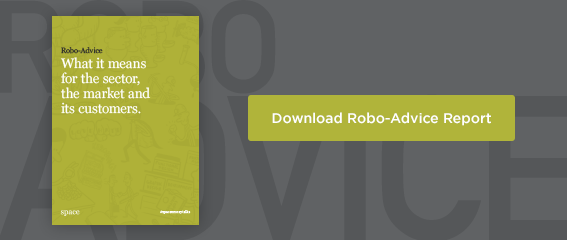On February 23rd, it was the decidedly hot topic of Robo-Advice that was under the spotlight in our quarterly finance forum, Money Talks.
Expert participants speaking their mind included Phil Brown Head of Policy at LV=, who recently took a majority stake in Robo-Advice company Wealth Wizards, Michael Ward MD of payingtoomuch.com, Adam Byford of Synaptic Software, Chris Daems Director of AE in a box and Cervello Financial Planning, Keith Churchouse Director of online advice provider, SaidSo.co.uk and Chapters Financial, Billy Burrows Independent Retirement Consultant and Malcolm Hurlston Chairman of Financial Inclusion Centre.
In the moderator’s chair for Space was respected financial sector journalist, John Lappin. You can download our full Robo-Advice report as a free PDF here. Or watch video clips from the session here.
Here are just a few highlights from the debate. Agree or disagree? Add your voice to the debate in the comments at the bottom of the blog.
Is Robo-Advice a threat to traditional IFAs?
Phil Brown of LV= says no: “I think Robo-Advice is complementary to a standard IFA practice. It will be looking to less affluent customers than a standard IFA. Someone with a £250,000 pension fund will want bespoke advice and they will get it from someone who they have been using for a while.”
Keith Churchouse agrees: “We run a traditional face-to-face model in Guildford, and I don’t see either of them impacting on each other for another decade.”
What happens when the robot gives bad advice?
Should it therefore be Robo-Guidance not Robo-Advice? Michael Ward of payingtoomuch.com certainly thinks so: “I think it is all going to end up being Robo-Guidance. According to the FSA, nine out of the 11 risk analysis tools they looked at in 2011 failed to accurately predict the risk appetite of a customer.”
Billy Burrows, retirement expert, is also unconvinced: “Would you trust a computer to choose a suit for you or a shirt or a dress? It is all subjective. How do you automate that?”
But AE in a box Director, Chris Daems takes an alternative view: “There is a big assumption here, that the human is infallible when in actual fact face-to-face advisers are as fallible as the algorithms we are talking about.”
Financial Inclusion and Markets Centre started giving what they called ‘e-advice’ in the field of debt, a decade ago. Malcolm Hurlston: “From ten years experience, I can tell you that Robo-Advice can produce just as good results.”
How do we get customers to engage with Robo-Advice?
Adam Byford of Synaptics suggests that the issue might be more complex than just introducing customers to the technology: “We need more education. We need to change the attitude towards savings and debt and we are fighting consumerism where people want everything now and are not looking to the future.
To me, it is about building that demand through educating people who will then want a service. What we call it, whether advice or guidance is some way down the road but I think the demand needs to be there.”
However, Keith Churchouse suggests that traditional marketing and advertising may be the answer: “From our point of view the market is in its infancy. We have been slightly cautious. I think it is going to be advertising and marketing that gets people to buy into the process.
We are not sure the public is ready for it yet. We think it might take another year, before they start to get to the reality that there are additional systems such as Robo-Advice. So they don’t have to come and sit in front of the likes of me in my Guildford office and wonder how much it is going to cost them.”
You can get the full story from the Space Money Talks Robo-Advice session by downloading Space’s free PDF report. You can also watch video highlights of the debate on the Space YouTube channel.
And don’t forget to add your comments and feedback below!
SHARE:
